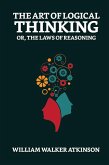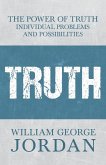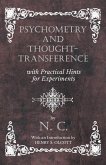What is thought? The answer is not an easy one, although we use the term familiarly almost every hour of our waking existence. The dictionaries define the term "Thought" as follows: "The act of thinking; the exercise of the mind in any way except sense and perception; serious consideration; deliberation; reflection; the power or faculty of thinking; the mental faculty of the mind; etc." This drives us back upon the term, "to think" which is defined as follows: "To occupy the mind on some subject; to have ideas; to revolve ideas in the mind; to cogitate; to reason; to exercise the power of thought; to have a succession of ideas or mental states; to perform any mental operation, whether of apprehension, judgment, or illation; to judge; to form a conclusion, to determine; etc."
Dieser Download kann aus rechtlichen Gründen nur mit Rechnungsadresse in A, D ausgeliefert werden.









